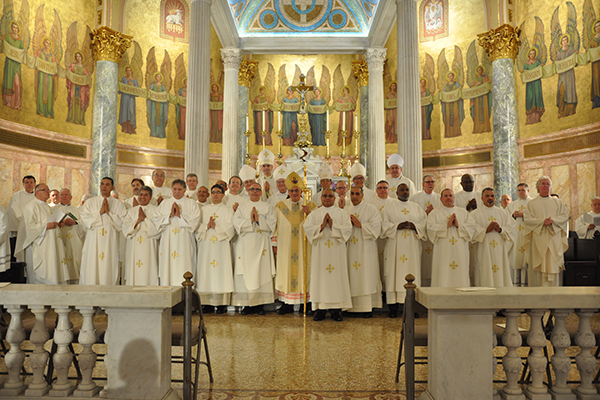
WINDSOR TERRACE — Deacon Jorge González recalled his teen years in San Jose, Costa Rica, living on the streets and running with a gang. But then he noticed a pretty girl in his neighborhood.
“The only way to go out with her was to go to church,” said González, now age 63. “You could say I did not have a good résumé, and the people knew who I was.
“I was lost, really lost.”
González followed the girl, Bernarda, to church, where he met Father Reynaldo Pol, a priest from Cuba.
“Father Pol hugged me and spoke to me about God’s love for me,” González said, “and that was it. I was completely taken. It was truly a moment of grace — and of the Holy Spirit. I had a profound sense of peace.”
González knew he had to help others find God.
“That’s my ministry,” he recently said, “because I know how much he wants to do the same for them.”
Today, González is director of the Diaconate Formation Office of the Diocese of Brooklyn, where he oversees the training of men seeking to become permanent deacons like him. These men are ordained by the Church to perform some of the same duties as priests, like witnessing weddings or performing baptisms. The deacons can’t celebrate Mass or hear confessions.
And in the Diocese of Brooklyn, many of the deacons are Hispanic, according to data from Deacon Julio Barreneche, secretary for clergy personnel.
“[The] total number of deacons [is] 220, of which 172 are active, and 48 retired,” Barreneche reported. “Ninety-two of the total are of Hispanic origin, which is about 42 percent of the total.”
González noted that “the Hispanic community has always been a good soil — a good field — for our diaconate candidates.”
“Right now, I have 59 men in formation; of them, 24 are Hispanic, either first-generation (immigrants) or either raised in this county by their families,” he added.
“We have deacons or diaconate candidates from all over Mexico, Dominican Republic, Peru, Ecuador, Colombia — pretty much all over Central America,” González said. Others come from Cuba and Puerto Rico, he added.
“In my class of 1998, we had 33 candidates, and 11 were Hispanics,” González said.
He warned, however, that, “We have to be very careful how we use this data.”
“We’ve had Hispanics in every (diaconate formation) class,” he said, “and the numbers have grown, yes. But we still have many Haitian, Irish-Americans, Italians, Polish, Africans, and African Americans.”
Still more come from China and Korea, he said.
According to González, the multiculturalism of Brooklyn and Queens is a blessing to the diocese and a beautiful reflection of God’s kingdom.

A common characteristic among permanent deacons is that nearly all of them are married. In the Brooklyn Diocese, 90 percent of deacons have wives, González said.
He and Bernarda eventually got married. Together, they have served the Church ever since. They immigrated to the U.S. to seek opportunities for their five children, who’ve all reached adulthood. The family has seven grandchildren and another one on the way.
González said he is an example of a first-generation immigrant member of the diaconate but he agreed that many come from second and third generations of immigrant families. In such cases, first-generation family leaders work to establish homes for their families, allowing succeeding generations to pursue religious vocations.
“We are seeing that phenomenon in the diocese,” said Bishop Nicholas DiMarzio of second or third generation candidates for vocations. “It’s amazing the progress they’ve made. Last year we saw more than half had a college degree, and some had a masters already.”
The Tablet asked González if Hispanic candidates seek the permanent diaconate over the priesthood because of their cultures’ profound value placed on children and families. He responded, yes, but that’s not the whole story.
He said marriage and the clergy are separate vocations, each with its own calling from God through the Holy Spirit. Deacons, therefore, have dual callings that must be “nurtured” through prayer and discernment.
The candidate’s wife and family must be committed as well.
Deacons also help teach Scripture and the preparations needed to receive the sacraments. They serve the Eucharist through participation in the Liturgy, and they promote works of mercy, justice, reconciliation, and peace.
According to the diocese, “Each state of the Church contributes in a unique way to its divinely given mission. Thus, the deacons of the Church are the sacramental sign of Christ’s Ministry of Service on behalf of the Church and the world.”
In the Diocese of Brooklyn, deacons don’t wear collars or other black, priestly attire, but they wear deacon’s vestments during services.
“I’ve always said the deacons are the bridge between the laity and the clergy,” Bishop DiMarzio said. “But in our diocese, they dress as laypeople, and they’re indigenous to the parishes where they serve.
“They are well-known, and I’d say admired by most people in the community. We’re blessed to have more than 150 active deacons right now. Their training is five years of instruction and very rigorous, which often leads to a master’s degree.”
González, an electrician by trade, said a deacon with a wife and children could be a great counselor to parishioners struggling with their own families.
“I can sit down with a parent and discuss what he or she is going through with a teenager,” he said. “We are enriched through being married. But I also bring the grace of ordination — able to bring the grace of holy orders into their lives to help them continue their journey with the Lord, and to overcome any difficulty they have.”
